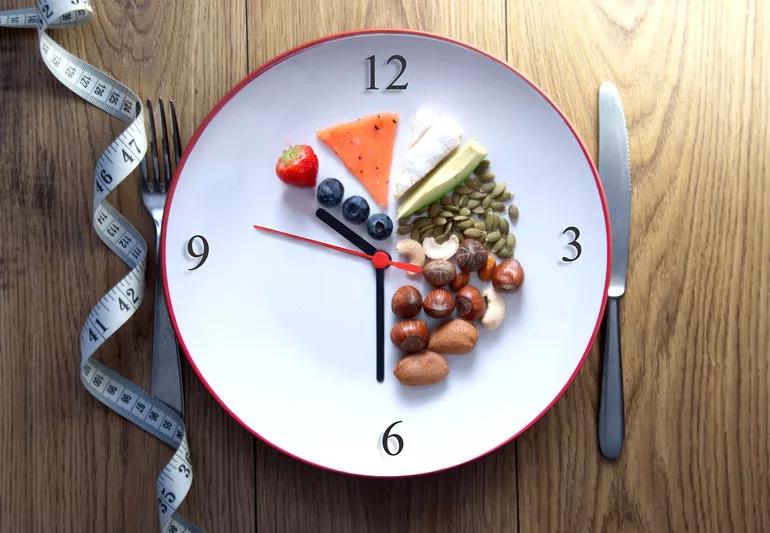A cardiologist's perspective on pros and cons of fasting

Image content: This image is available to view online.
View image online (https://assets.clevelandclinic.org/transform/1bf409a1-633e-42c8-963e-0764f0e8f5ed/intermittentFasting-1195242497-770x533-1_jpg)
Plate indicating intermittent eating and fasting
Do you sometimes fast for religious reasons or as a lifestyle choice? If so, you may wonder what impact fasting has on your health. Can it reduce your blood pressure? Is it healthy for your heart? Is it dangerous in certain situations?
Advertisement
Cleveland Clinic is a non-profit academic medical center. Advertising on our site helps support our mission. We do not endorse non-Cleveland Clinic products or services. Policy
Cardiologist and endocrinologist Dennis Bruemmer, MD, PhD, sees many advantages in fasting from food for short periods. And, given our current understanding of mechanisms linking excessive weight to heart disease and the benefit of weight loss, he expects that more people will want to attempt it.
Though it depends on what you’re hoping to accomplish (and it’s not safe for everyone), it’s beneficial to limit your food intake, in general. “By every measure, eating less is better,” Dr. Bruemmer says.
Evolution has equipped us with the unique ability to store energy for periods of deprivation. However, in today’s world, food — and mostly unhealthy food — is available all around us. Across all species, including worms, flies, rodents, dogs, monkeys and humans, very few interventions have ever been shown to prolong life. But in all of these species, fasting and eating less is clearly one of them.
Below, Dr. Bruemmer answers questions about fasting and offers some tips for exploring it.
Research shows that fasting can help lower blood pressure, reduce cholesterol, control diabetes and reduce weight.
“Four of the major risks for heart disease are high blood pressure and cholesterol, diabetes and weight, so there’s a secondary impact,” Dr. Bruemmer says. “If we reduce those, we can reduce the risk of heart disease.”
Advertisement
One word of caution, though: Fasting can lead to an electrolyte imbalance. This can make the heart unstable and prone to arrhythmias.
“So whenever we prescribe certain diets, including a very low calorie diet and protein-sparing modified fast diet, these require medical supervision. We check blood tests monthly and prescribe potassium supplementation to prevent electrolyte imbalance from occurring,” Dr. Bruemmer says.
Some studies also show that fasting may help prevent cancer or increase the effectiveness of chemotherapy treatment.
However, much of the research on fasting is in preliminary stages. “We have a lot more to learn about fasting,” he says.
Although it offers health benefits — including reduced heart disease and weight loss — it’s not really the best way to lose weight, Dr. Bruemmer says. While fasting helps you drop pounds quickly, it doesn’t help you stay in shape.
“For long-term weight loss, it’s not terrific,” he says. “The only time we really recommend fasting for weight is if someone needs rapid weight loss, for instance, for surgery.”
Fasting is not safe for everyone — so consult your physician before you begin.
Those who should not fast include:
Fasting may also have a negative impact on people with other medical problems. Your doctor can help determine whether it is right for you, Dr. Bruemmer says.
Some people fast for eight hours, 24 hours or longer. Others cut way back on calories for a certain number of days each week or month.
The popular “5, 2” plan involves two days of caloric reduction each week. You eat two meals (totaling about 500 calories) on fasting days. On non-fasting days, you follow a healthy diet, but you don’t restrict calories.
“You want to make sure you have adequate nutrition before and after the fast,” Dr. Bruemmer says. And when you’re consuming less overall, it’s important to make sure your nutrition is sound when you do eat.
Healthy foods to eat before a fast include:
Avoid foods that are high in sodium or which may cause bloating, such as canned soup and pizza.
Don’t suddenly start eating everything in sight when you’re done fasting.
“You don’t want to shock the system,” Dr. Bruemmer says.
Instead, it’s best to start by snacking on a few dates or other dried fruit, for instance. Then take a break, and then eat fruit and other light foods at first.
Advertisement
“Whether doing a fast for lifestyle or religious reasons, it’s always wise to talk to your doctor first,” Dr. Bruemmer says.
Center for CardioMetabolic Health
Advertisement

Sign up for our Health Essentials emails for expert guidance on nutrition, fitness, sleep, skin care and more.
Learn more about our editorial process.
Advertisement
Planning ahead, checking in with your care team and being vigilant about blood sugar monitoring can help ensure a safe fast
It’s best to exercise before or after your fast, instead of during it
Plan ahead by hydrating, cutting back on sugar and managing medications
Fasting can significantly impact your hormones — proceed with caution
This short-term diet is for those who want to lose a significant amount of weight quickly
An expert breaks down how and why people try it
'Early time-restricted feeding' can produce health + weight-loss benefits
A satisfying veggie option with a kick
Type 2 diabetes isn’t inevitable with these dietary changes
Applying a hot or cold compress can help with pain
Pump up your iron intake with foods like tuna, tofu and turkey